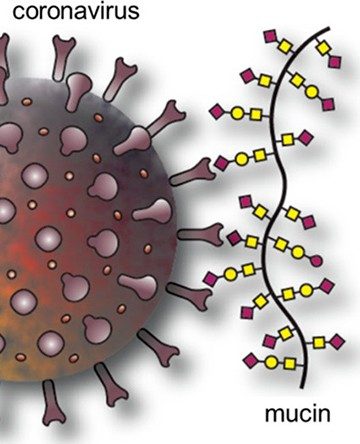FOR IMMEDIATE RELEASE
ACS News Service Weekly PressPac: March 02, 2022
Mucus could explain why SARS-CoV-2 doesn’t spread easily from surfaces
“Mucins Inhibit Coronavirus Infection in a Glycan-Dependent Manner”
ACS Central Science
Early in the pandemic, many people fastidiously disinfected surfaces because laboratory studies predicted that SARS-CoV-2 could be easily transmitted in this way. Now, researchers reporting in ACS Central Science have found a possible explanation for why the predictions didn’t pan out: Sugar-decorated proteins in mucus could bind to the coronavirus on surfaces, keeping it from infecting cells. The findings could also hint at why some people are more vulnerable to COVID-19 than others.
Although experiments have shown that coronaviruses can persist on surfaces for days or weeks, it is now apparent that SARS-CoV-2 is much more likely to infect people through airborne droplets carrying the virus. The surface studies typically used viruses suspended in buffers or growth media, whereas in the real world, SARS-CoV-2 is coated in mucus when someone coughs or sneezes. With this in mind, Jessica Kramer and colleagues wondered if mucus components could explain the discrepancy between the lab predictions and reality. In addition to water, salts, lipids, DNA and other proteins, mucus contains proteins called mucins, which are heavily modified with sugar molecules known as glycans. To infect cells, the SARS-CoV-2 spike protein binds glycan molecules with sialic acid at their ends on the cell surface. So, the researchers wondered if the coronavirus also recognizes sialic acid-containing glycans in mucins. If the spike protein is already bound to glycans in mucus, perhaps it couldn’t bind to the ones on cells, they reasoned.
For safety reasons, the researchers chose to study a human coronavirus called OC43, which evolved relatively recently from a cow coronavirus and causes mostly mild respiratory infections. The team deposited droplets of the virus in buffer or growth medium supplemented with 0.1–5% mucins, which corresponds to the concentration range of mucins found in nasal mucus and saliva, onto a plastic surface and let the drops dry. Then, they rehydrated the viral residue and measured its ability to infect cells. In comparison to the buffer or growth medium alone, the solutions supplemented with mucins were dramatically less infectious. The team also tested steel, glass and surgical mask surfaces, finding similar results.
The researchers showed that, as the droplets dried, mucins moved to the edge and concentrated there in a coffee-ring effect, bringing the virus with them. This brought mucins and virus particles close together, where they could more easily interact. Cutting off sialic acid glycans from mucins with an enzyme eliminated viral binding and destroyed the glycoproteins’ protective effect. Because SARS-CoV-2, like OC43, binds to sialic acid glycans on cell surfaces, mucins would also likely reduce its infectivity, the researchers suspect. The levels and types of sugar molecules on mucins can vary with diet and certain diseases, which could possibly explain the vulnerability of certain people to COVID-19, they say.
The authors acknowledge funding from the National Science Foundation.
###
The American Chemical Society (ACS) is a nonprofit organization chartered by the U.S. Congress. ACS’ mission is to advance the broader chemistry enterprise and its practitioners for the benefit of Earth and all its people. The Society is a global leader in promoting excellence in science education and providing access to chemistry-related information and research through its multiple research solutions, peer-reviewed journals, scientific conferences, eBooks and weekly news periodical Chemical & Engineering News. ACS journals are among the most cited, most trusted and most read within the scientific literature; however, ACS itself does not conduct chemical research. As a leader in scientific information solutions, its CAS division partners with global innovators to accelerate breakthroughs by curating, connecting and analyzing the world’s scientific knowledge. ACS’ main offices are in Washington, D.C., and Columbus, Ohio.
To automatically receive press releases from the American Chemical Society, contact newsroom@acs.org.
Note: ACS does not conduct research, but publishes and publicizes peer-reviewed scientific studies.
Media Contact
ACS Newsroom
newsroom@acs.org

View larger image

